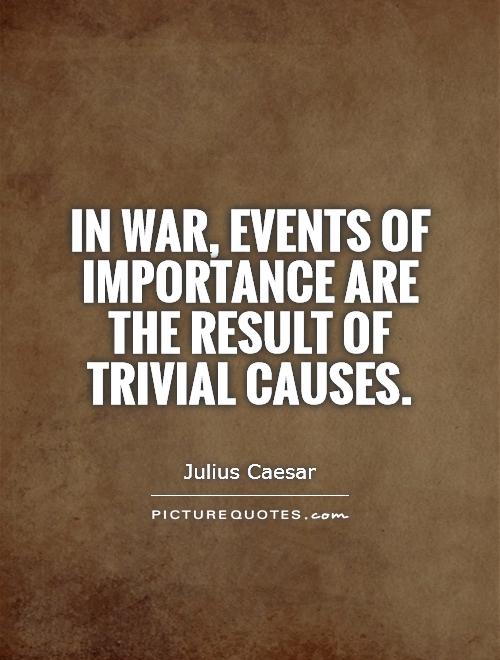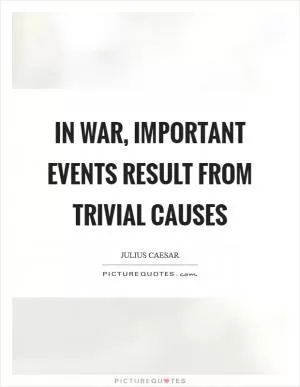In war, events of importance are the result of trivial causes

In war, events of importance are the result of trivial causes
Julius Caesar, one of the most famous figures in ancient history, is often quoted as saying, “In war, events of importance are the result of trivial causes.” This statement reflects Caesar’s understanding of the unpredictable nature of warfare and the role that seemingly insignificant events can play in shaping the course of history.Caesar himself experienced firsthand the truth of this statement during his military campaigns in Gaul and his subsequent civil war with Pompey. In Gaul, Caesar’s conquest of the region was not the result of a single decisive battle or grand strategy, but rather a series of small victories and fortunate circumstances that gradually expanded his control over the territory. For example, Caesar’s victory at the Battle of Alesia, which is often seen as a turning point in the Gallic Wars, was the result of a series of tactical decisions and lucky breaks that allowed him to defeat the Gauls despite being heavily outnumbered.
Similarly, in his civil war with Pompey, Caesar’s eventual triumph was not the result of overwhelming military might or superior strategy, but rather a series of unexpected events and fortunate coincidences that worked in his favor. For example, Caesar’s decision to cross the Rubicon River and march on Rome was a risky move that could have easily backfired, but it ultimately led to his victory over Pompey and the establishment of his dictatorship.
Caesar’s words also reflect a broader truth about the nature of war and human history in general. In many cases, the course of events is shaped not by grand plans or heroic deeds, but by small, seemingly insignificant actions and chance occurrences that have far-reaching consequences. This is especially true in the chaotic and unpredictable environment of war, where even the most carefully laid plans can be derailed by unforeseen events.
Overall, Caesar’s statement that “In war, events of importance are the result of trivial causes” serves as a reminder of the complex and unpredictable nature of warfare and the role that chance and circumstance can play in shaping the course of history. It is a testament to the fact that even the most powerful and influential figures are ultimately at the mercy of fate and the whims of fortune.












 Friendship Quotes
Friendship Quotes Love Quotes
Love Quotes Life Quotes
Life Quotes Funny Quotes
Funny Quotes Motivational Quotes
Motivational Quotes Inspirational Quotes
Inspirational Quotes